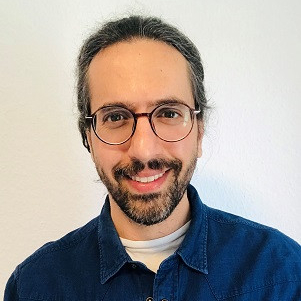“LinkedTrust is a system and universal format for collecting credibility claims in a graph, so that funds can be directed to individuals who are performing verified work that witnesses or recipients can attest to the value of. This empowers donors to give directly and to receive verification of exactly how the funds are used. The result of this system is to empower individuals doing valuable work to be recognized and supported, and to empower individual volunteers and donors to help shape the network through attestations. This directs funds to highly effective uses and supports more individuals per dollar than centrally controlled methods that require high administrative salaries to support,” says Golda Velez.
Sign up to meet Golda Velez on 20 September to discuss your interest in LinkedTrust applications.
Contact Golda Velez with your professional interest in LinkedTrust applications.
Sebastian Klemm: How do you apply LinkedTrust for comprehensible and verifiable allocation of donations and funding?
Golda Velez: LinkedTrust is a system and universal format for collecting credibility claims in a graph, so that funds can be directed to individuals who are performing verified work that witnesses or recipients can attest to the value of.
This empowers donors to give directly and to receive verification of exactly how the funds are used.
Optionally donors can also volunteer to be witnesses or mentors, or in the case of a larger organization to have some of their trusted volunteers or staff join the mentor network. This creates a credibility graph, where volunteers vetted by the donor organization can directly verify some of the work, and people who are verified as credible by those volunteers can verify others.
Funds can be granularly tracked and linked to specific outcomes and performance. Identities may need to be obscured for privacy, but the graph of attestations can be made visible to trusted actors.
Sebastian Klemm: What does LinkedTrust enable in particular?
Golda Velez: The result of this system is to empower individuals doing valuable work to be recognized and supported, and to empower individual volunteers and donors to help shape the network through attestations.
This directs funds to highly effective uses and supports more individuals per dollar than centrally controlled methods that require high administrative salaries to support.
Sebastian Klemm: What are your current and ongoing use cases with LinkedTrust?
Golda Velez: Currently, we accomplish these goals through a network of relationships, where individuals are referred by others or may have started in a volunteer internship to gain skills.
Kenya
In Nairobi, Gitonga Miriam originally volunteered to work for equity to gain connection and skills. Since then she has accepted a paid position performing test engineering tasks and online community management. She is highly motivated as well to address gender violence in the Kibera area, and we recommended her to a small nonprofit – She Can Tri – which funded a swimming program for girls from Kibera. Gitonga arranged for the security, a pool, swim coach and transportation. The total cost of the program was under $2000 and served 20 girls, who received swim lessons, leadership and rights training.
Afghanistan
<B> (original name obscured for privacy) was introduced to us by an NGO in Afghanistan along with several other professional women who had worked for NGOs before the fall to the Taliban. All of the women are seeking remote work.
<B> in particular is motivated to help other girls have access to education, because of her own experiences in how powerful this was for her. She teaches 80 women and girls remotely, in secret, in English, chemistry and other subjects. <B> has provided multiple images of the activity, but these cannot be made fully public since the women would be in danger. By circulating information to a few contacts about $3000 has been raised and used to pay for remote access and a few materials.
More funding is badly needed, but because wide publicity is dangerous, this information needs to be circulated discreetly among potential funders. The work is validated by live zoom calls with the students, sometimes with volunteer remote teachers.
Syria
Mohammed Kamal volunteered to help with a human rights organization Raise the Voices and did valuable work translating the writings of a kidnapped Iraqi journalist, which had been requested by Freedom Now in evaluating his case.
Since then he has been provided with a minimal support of $100/mo which has enabled him to spend several hours a day working on human rights cases and also applying for grants to continue the work. His work is attested to by other volunteers in Raise the Voices and by direct verifiable written outputs.
Myanmar
Han T, Nan T, Phoo Phoo and Kant were recommended by a Raise the Voices contact as individuals involved in the civil disobedience movement against the Myanmar junta, and as seeking work or learning opportunities as the movement has asked students not to participate in the military take over of the education system.
In each of these cases, direct contacts can vouch for the credibility of the recipient and the value of the work performed.
Sebastian Klemm: What is the technical readiness level of LinkedTrust?
Golda Velez: In order to productize and automate this concept which we initially have manually operated, we have held a number of open technical discussions with the principal coder of Trustgraph and others in the decentralized web community.
The outcome of these discussions was a minimal format for a signed claim, that we have implemented in a postgres database with a next.js front end for visualizing the claims. An implementation that stores the signed claims in a decentralized way was also entered in the EthCC Ceramic hackathon and we are awaiting the results.
The data models, storage and simple entry capability are already present.
In order to integrate our approach to a specific organization’s use case, we would need to build two adaptations. First, to create a User Interface that would be clear and relevent to that use case, with a limited vocabulary that will make sense to the organization workers and volunteers to enter data. Second, to create a scoring model appropriate to the use case, ie scoring for the target impact.
Optionally, we may also want to build a data pipeline to import data from the organization’s existing records, anonymizing any personal data. You can see an overview of the architecture and additional applications at cooperation.org/linked_trust/
Sebastian Klemm: What next steps do you aspire to tacke and what support can you use?
Golda Velez: In order that the development of the LinkedTrust system should immediately and tangibly benefit target populations, the funds will generally be split 50-50 between the direct impact and the technology development of LinkedTrust. Each project will advance specific technical aspects.
Specifically, we are seeking funding for:
Securely Verified Remote Classes in Afghanistan
Dara speakers on location run remote English, science and programming classes in Afghanistan and have vetted volunteers in America and Europe certify that the classes are occurring, without identifying the individual women students and teachers.
The claims will be made that a class is occurring in a vulnerable area , but will not even identify the country or location specifically to the public. An encrypted claim with more specifics will be available to donors and trusted parties only.
Costs:
- $10K for teachers, materials, wifi costs and volunteer administration.
- $10K for development of the interface for volunteers to securely enter validations, and for the encrypted interface for donors to view additional information.
Technical advance:
- Encrypted claims with password protection
Testimony Database of Disappeared Individuals
Human rights organizations – such as Human Rights Watch, Freedom Now – are overloaded with case work, and they often can not take on new reports of disapparances or kidnappings.
There is a need for an entry point for families and friends of disappeared individuals to enter data that has not yet been fully vetted, and also news reports etc so that this information can be collected together.
We have already built a prototype for a global database of testimonies of disappeared individuals, testimonies.raisethevoices.org that was based on the Uyghur testimonies database at shahit.biz.
We need funding to expand this system using LinkedTrust, to pay interns and organize volunteers to assist families with entering data, and when necessary to anonymize the original source of information.
Cost:
- $15k to build an automated bridge between https://testimonies.raisethevoices.org and LinkedTrust system
- $15k to support 3 journalism student interns for 2 months to spend time interviewing and reviewing cases to enter into the system
Technical advance:
- Bridge to journalistic sources, user interface for journalists
Ongoing need: Support for training projects in Syria, Myanmar, Kenya, Afghanistan
Here, any amount is helpful. Funds will be used to support teachers and provide small daily stipends for students where that is essential, and signed claims about the work will be written to the LinkedTrust graph and visible to donors (ie reported on OpenCollective).
In some cases the identities and location will be obfuscated and further details will be provided in direct communications until the encrypted system is in place.
Donate: https://opencollective.com/raise-the-voices
Sign up to meet Golda Velez on 20 September to discuss your interest in LinkedTrust applications.
Contact Golda Velez with your professional interest in LinkedTrust applications.






